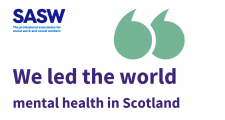We led the world, a SASW blog on mental health

Back in 1997 Scotland was the sickest nation in Europe. We had the highest rates of suicide in Europe. Only Finland came close. We had the highest rates of addiction to alcohol in Europe. Again, only Finland came close. We also had the highest level of drug deaths in Europe. No-one came close.
The 1997 Labour landslide election came with enormous optimism with progress in the peace process in Northern Ireland, devolution and reinstatement of Scotland’s Parliament and the creation of the National Programme for Improving Mental Health and Wellbeing in 2001. The programme was ambitious. It was going to raise awareness of mental health as the third most common reason for a GP appointment, address the stigma attached to mental health that prevented so many people seeking help, address the rising suicide rate, reform training for frontline workers and engage lived and living experience as an asset to improve current services and develop new ones. It was a time when we, traditionally sceptical and pessimistic, Scots, especially those of us living with conditions, began to see light at the end of the tunnel. We were suddenly hopeful. Within a few years our Scottish Recovery Network was leading Europe in developing new models of mental health recovery and our SeeMe anti-stigma campaign was winning plaudits for media advertising and both workplace and schools campaigns that were having a dramatic effect on people’s wellbeing.
Sadly, 14 years of austerity and underfunding of public services has undermined the progress we made. Comparisons with our European neighbours has become more difficult since BREXIT but as a marker, 7.2% of EU citizens in 2019/20 reported having chronic depression. In the EU Portugal had the highest reported rate at 12.2%. In 2022 the Scottish Health Survey reported a 5% increase in adults reporting symptoms of depression since 2010. Scotland now has 13% of its adult population reporting two or more symptoms of depression and leads Europe in drug deaths with 24.8 per 100,000 (the GB figure is 8.8, EU 1.8). Suicide deaths are also increasing after a fall in the early 2010’s.
The progress we made has disappeared. Where we once led Europe and had Finnish and Norwegian delegations visiting our landmark projects to learn how to address addiction and mental health problems, we now lag behind innovative programmes in those very countries, using what they learned from us. We will ‘rise again’, but not while our services, our social workers, our social care workers are hobbled by underfunding and an assumption that only the NHS has the answer.
By Frank Reilly